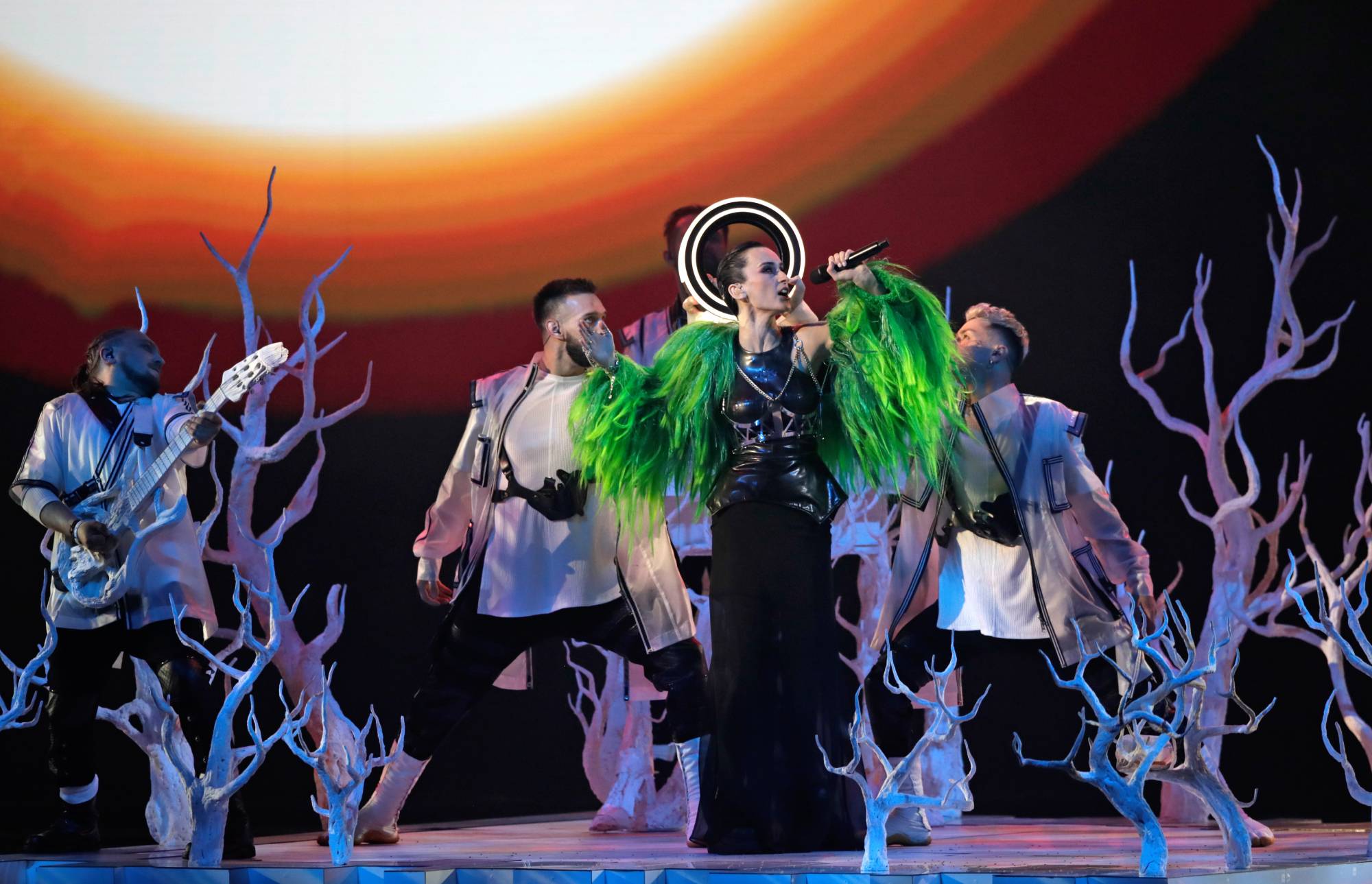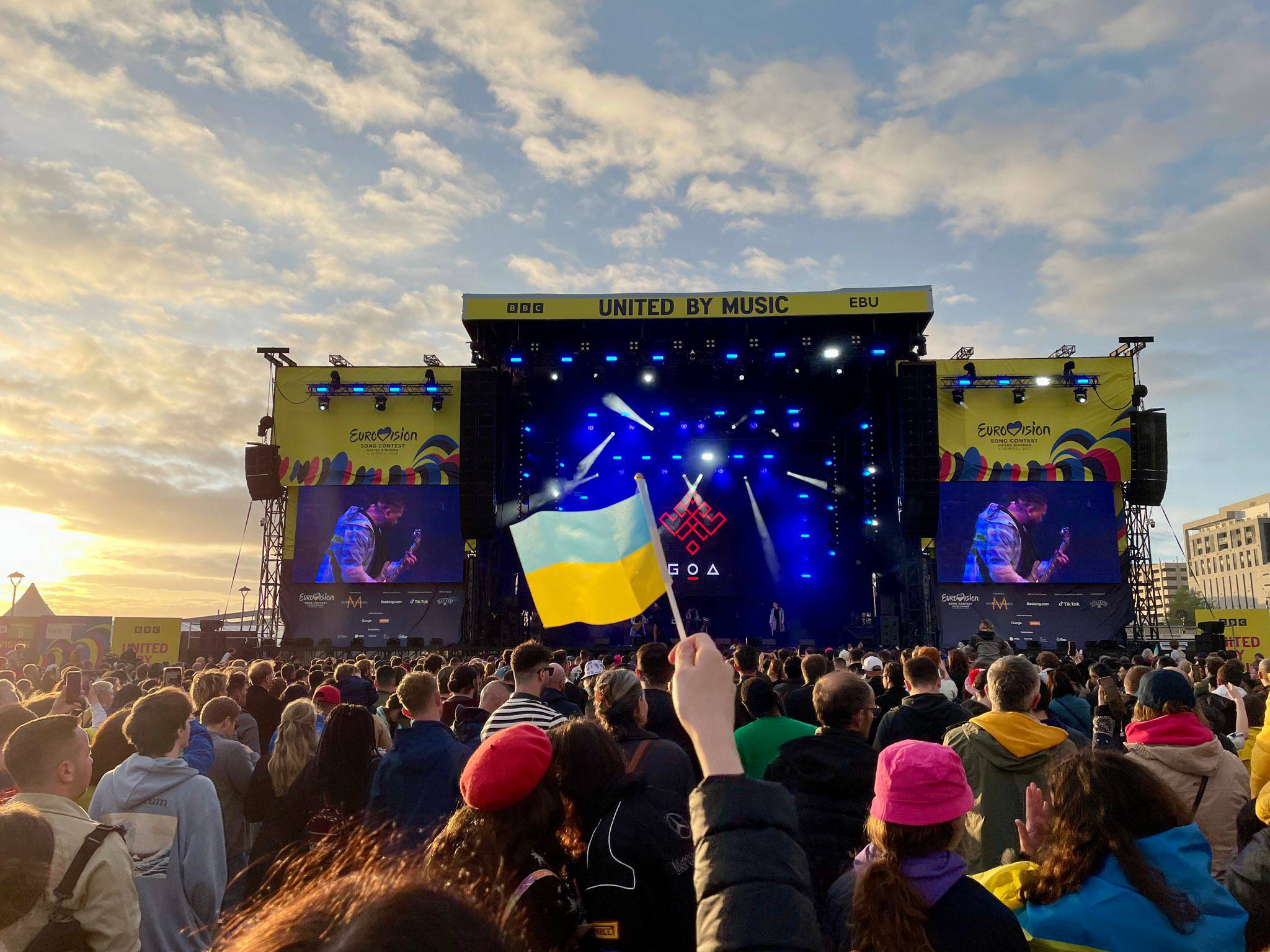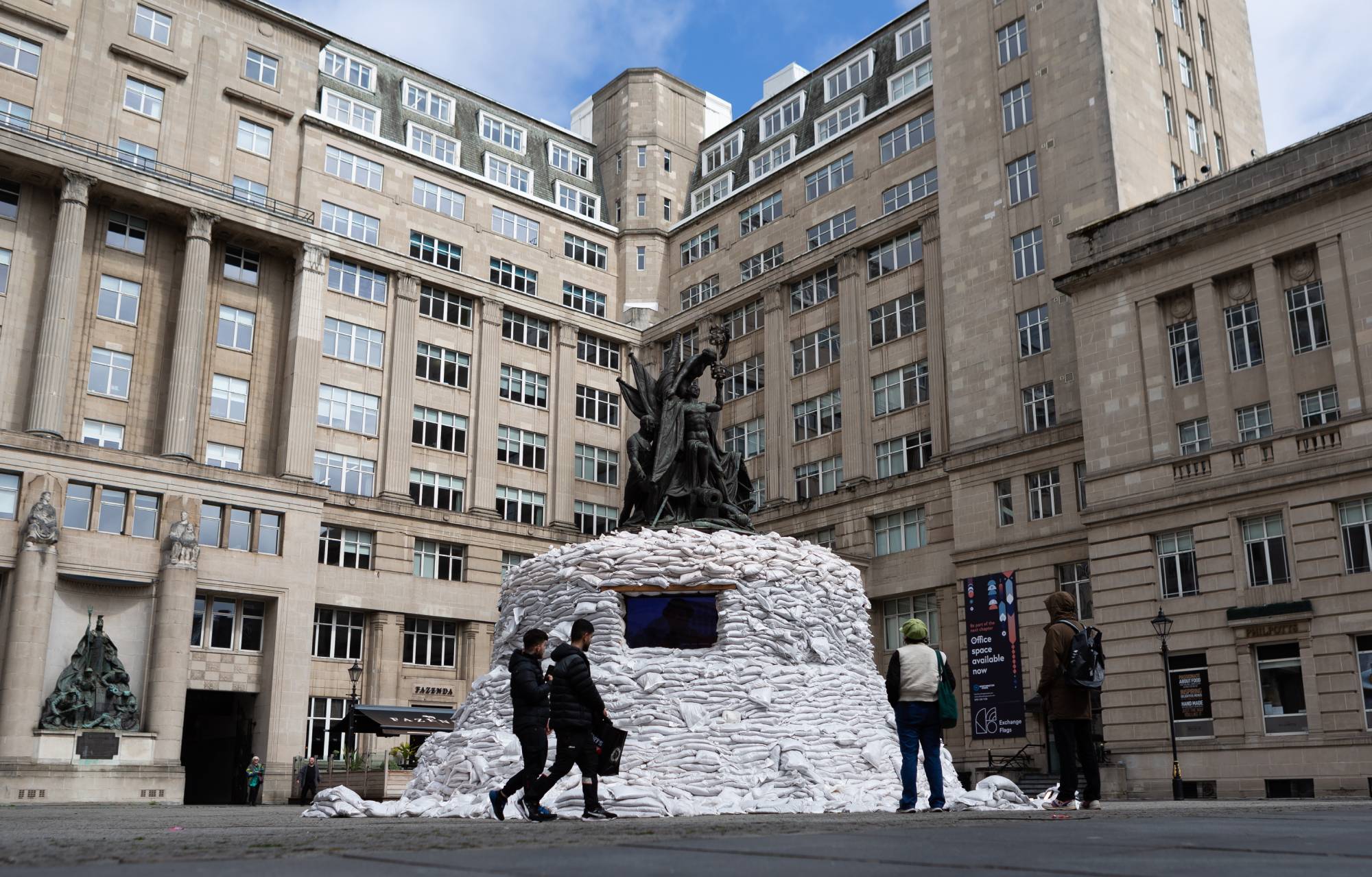Crimea, “Azovstal” and “Fraternal Nations”: What Is Happening Around “Eurovision-2023” and Why the Competition Is Called the Most Political in History

From May 9 to May 13, the Eurovision Song Contest 2023 will occur in Liverpool. Despite Ukraine’s victory, the event was moved to Great Britain, which took second place last year due to a full-scale Russian invasion. However, Ukraine is still represented at the competition: the band TVORCHI will fight for the title of a winner from our country, and a number of events related to Ukrainian culture are organized in Liverpool. This year’s Eurovision Song Contest is under the slogan “United by Music,” but it is already being called the most politicized in history. We tell you why, despite the war, Ukraine continues to participate in the competition.
Ukraine’s unsuccessful and victorious path at Eurovision
Ukraine debuted at Eurovision in the 48th year of the song contest — in 2003, Oleksandr Ponomaryev represented the country in Riga with the song Hasta la Vista. The composition tells about the quarrel of lovers who manage to break up and reconcile quickly. The singer received 30 points from the international jury and took 14th place out of 26.
However, Ukraine did not have to wait long for success at the Eurovision Song Contest. The following year, Ruslana won the contest with the song Wild Dances, so the jubilee 50th Eurovision Song Contest took place in Kyiv. A few months before it was in Ukraine, the Orange Revolution ended, and its unofficial anthem, Together we are many, performed by the band Greenjolly, was chosen by Ukraine as a competition song. For the performance at Eurovision, the team had to remove the political undertones of the song – this was against the rules. In Europe, not everyone understood the meaning of the song due to a lack of interest in Ukraine’s social and political life at that time. The result is 19th place out of 24.
The next success of Ukraine at Eurovision was Verka Serdyuchka’s performance in Helsinki in 2007. Her song Dancing Lasha Tumbai took second place in the competition but simultaneously provoked controversy in neighboring Russia. At that time, federal channels actively promoted the theory that Serdyuchka was singing “Russia goodbye.” Andriy Danylko explained that he was inspired by the song “Boshentumai” by the Soviet band “Kino.” However, after the start of a full-scale war, Danylko officially announced that he was changing the song’s lyrics to “Russia goodbye.”
“Not every legend is a winner. Not every winner is a legend”, they wrote in the comments under the video of his Eurovision performance.
The next bright and winning performance occurred in 2016 when the Crimean Tatar singer Jamala appeared on the Eurovision stage. Her song 1944 is dedicated to the forced deportation of Crimean Tatars during the Second World War, and the chorus is from the Crimean Tatar folk song Ey, güzel Qırım (“My beautiful Crimea”). After the performance in the final, some European media and, in particular, in Russia, Jamala began to be accused of politicizing the contest. However, the European Broadcasting Union said that the composition does not violate the rules of Eurovision.
However, at the next home Eurovision, Ukraine continued the trend of unsuccessful performances. The band O.Torvald with the song Time took 24th place out of 25. It is Ukraine’s worst result in the competition.
Since then, the bands Go_A (2021, fifth place) and Kalush Orchestra (2022, victory) have performed the most successfully from Ukraine. The song of the first band, Shum, is based on the vesnyanka of the same name. Its text is related to the spring awakening of nature. In May 2021, the track topped Spotify’s global ranking and became the first Ukrainian-language song on the international Billboard chart. Also, Kalush Orchestra frontman Oleg Psyuk dedicated the song Stefania to his mother. After February 24, 2022, the track began to take on new meanings — particularly as a dedication to all Ukrainian women who bear the imprint of a full-scale invasion.

Go_A performance at Eurovision 2021. Photo: AP Photo / Peter Dejong
The reverse side of the Ukrainian Eurovision
The annual scandals surrounding the Eurovision Song Contest can be called an unofficial tradition of the competition in Ukraine. Everyone from the participants of the national selection to the guests invited to the competition and directly voting for the winner comes under mass discussion and criticism..
So, in 2019, Ukraine refused to participate in the song contest altogether. According to the selection results, the singer MARUV was supposed to represent the country. Still, the Public Broadcasting Company of Ukraine (PBCU) could not agree with the artist under the contract terms. After that, PBCU tried to settle with Freedom Jazz and KAZKA bands, which took second and third place in the national selection, but the TV and radio company was refused in both cases
Alina Pash was originally supposed to represent Ukraine at Eurovision 2022. However, immediately after the announcement of the results, the Kalush Orchestra, which took second place in the national selection, announced its suspicion of falsification of the counting of audience votes. Subsequently, the organizers of the national selection altogether deprived Alina Pash of the right to participate in the competition due to the forgery of a certificate of a visit to Crimea through the administrative border in Ukraine — this is how the singer tried to prove that she was on the territory of the occupied peninsula without violating Ukrainian legislation. Therefore, the Kalush Orchestra eventually went to the Eurovision Song Contest, which was victorious for Ukraine.
During Eurovision 2022, Ukrainian viewers gave neighboring Poland 12 points and the national jury — none. At the same time, Kalush Orchestra received 12 points each from the jury and the audience of Poland — the maximum possible result. This situation caused a flurry of criticism not only in social networks but also in Ukrainian politics: the speaker of the Verkhovna Rada of Ukraine, Ruslan Stefanchuk, called the national jury “far from the people” and the head of the Ukrainian Ministry of Culture, Oleksandr Tkachenko, emphasized that the evaluation of the jury, for which he was humiliated, did not reflect the attitude of Ukrainians towards Poles.
How thanks to Eurovision, the world paid attention to Ukraine and its culture
Jamala was the first to draw attention to the war in Ukraine and the temporary occupation of Ukrainian territories. In 2015, Ukraine refused to perform at the Eurovision Song Contest for the same reasons.
The song 1944 is dedicated to the deportation of the Crimean Tatar people and was recorded against the background of renewed repression against the Crimean Tatars after the temporary occupation of Crimea. In addition, this is the first song in the contest’s history in which we can hear the Crimean Tatar language. In the complex, this helped draw attention to the history and culture of the Crimean Tatars, also, among Ukrainians.
Go_A helped to look into Ukrainian folklore. Shum is an ancient Ukrainian vesnyanka that originates from pre-Christian times. Folklorists have been studying it for many years: it was first described by the ethnographer Mykhailo Maksymovych in the 19th century, and later Boris Grinchenko and Mykhailo Hrushevskyi wrote about Shum.
The most important performance of Ukraine at Eurovision was probably the last one. It distinguished itself not only with Stefania’s song and pink panama but also with Oleg Psyuk’s appeal, “Help Ukraine, Mariupol, save Azovstal right now!”. After that, the number of searches for the word Azovstal increased on Google, and the band thereby managed to draw attention to the Russian blockade of Mariupol and the defenders of Azovstal.
How Ukraine is mentioned in Liverpool
And although the song contest does not take place in Ukraine, Liverpool is trying to recreate the Ukrainian identity during its time, popularizing Ukrainian culture. It is a whole complex of events that tell the world about Ukraine, creating the effect of presence, as if the competition is not taking place in Britain.
Go_A, Kalush Orchestra, Vierka Serdyuchka, Jamala, and Tina Karol will perform in the grand final of the competition, and Ukrainian and British performers Maria Yaremchuk, OTOY, Alyosha, Zlata Dzyunka, Rita Ora and Rebekah Ferguson, as well as Yulia Sanina (The Hardkiss), which also acts as one of the presenters of the competition.

Photo: Visit Liverpool
In addition, the city hosts the EuroFestival, a Ukrainian-British festival dedicated to Ukrainian culture. A total of 24 projects are presented, 19 of which are collaborations between British and Ukrainian artists. It started on May 1 and will continue until the 14th.
So, for example, 12 luminous nightingales were created for the festival and placed all over the city. Each installation represents a separate region of Ukraine. And as part of the exhibition of the Ukrainian artist Katya Buchatska’s “Izum — Liverpool,” the Liverpool Cathedral was turned into a railway carriage.
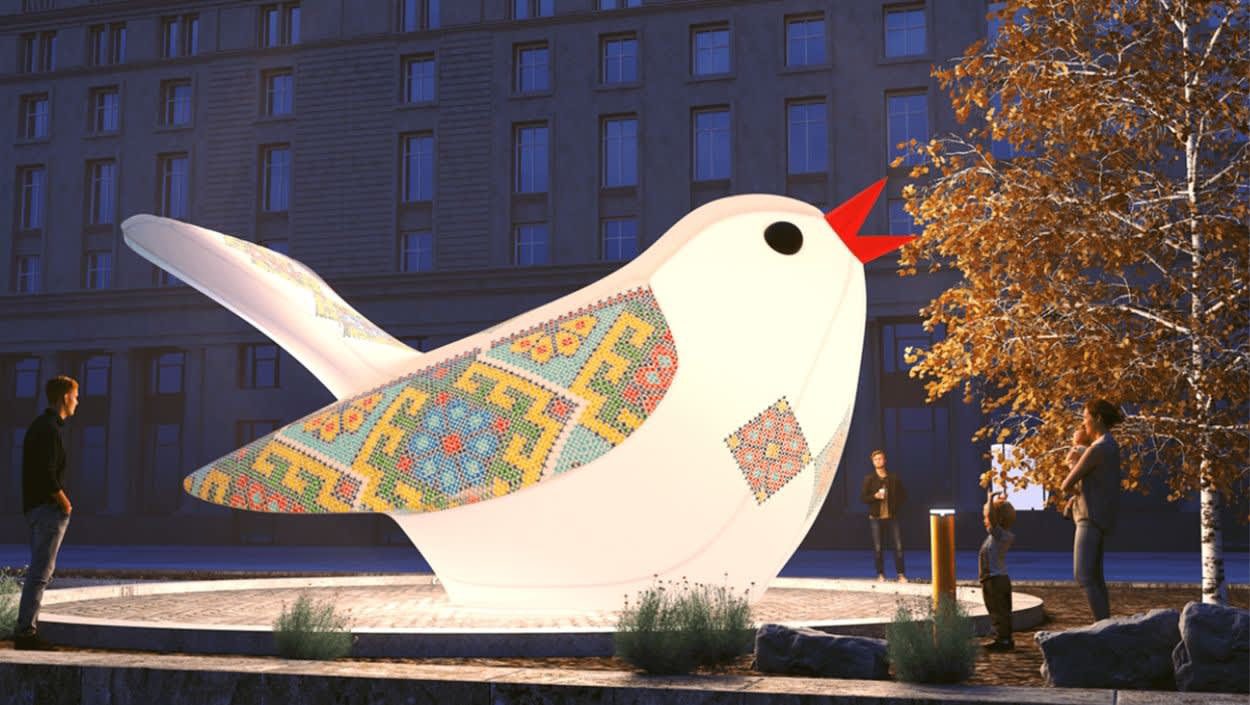
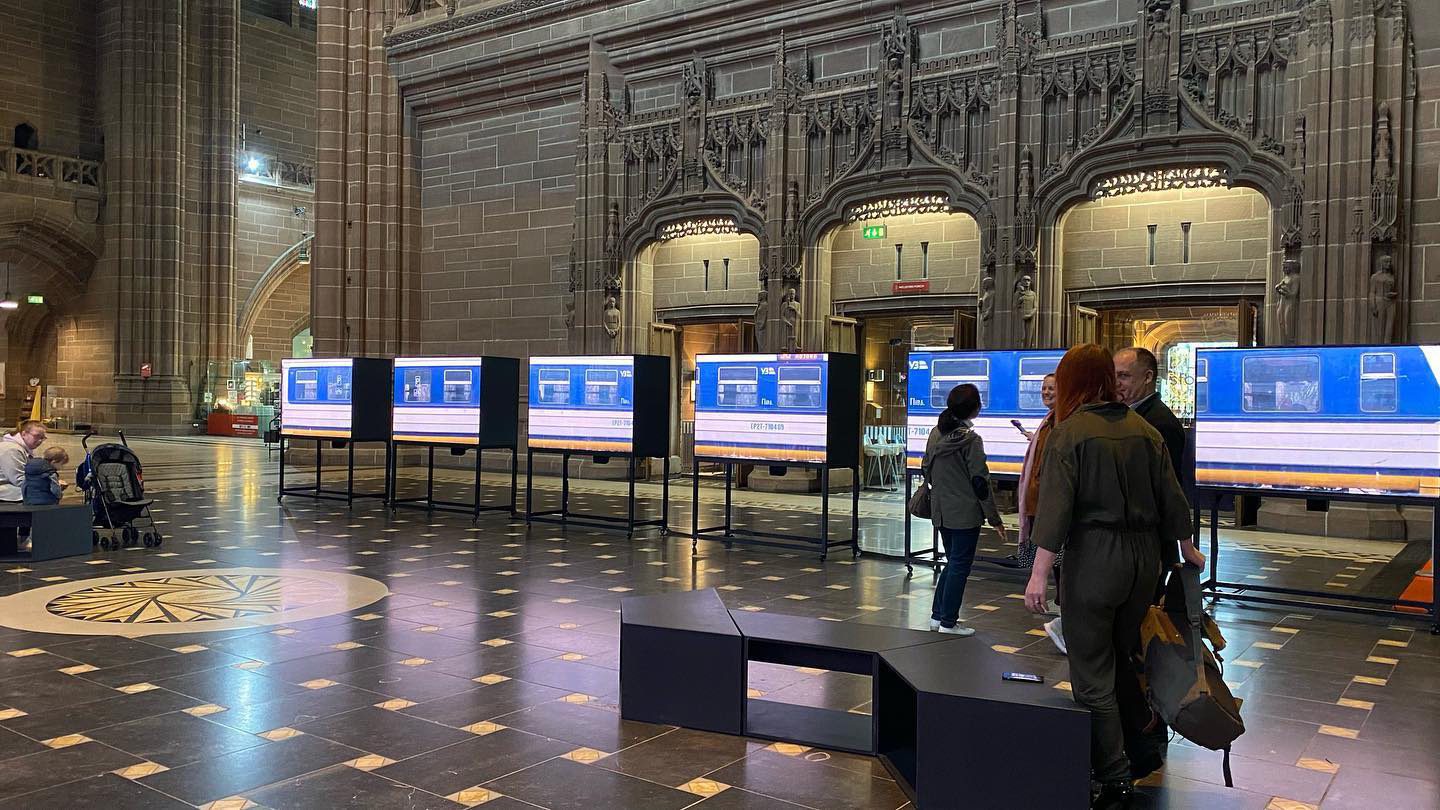
And as a reminder of the full-scale war, the monument to Admiral Horatio Nelson in Liverpool was covered with sandbags as a sign of solidarity with Ukraine.

Photo: EPA / ADAM VAUGHAN
On May 9, during the first semi-final, the Ukrainian singer Alyosha and the British Rebekah Ferguson, who became guests, performed the song Ordinary World by the band Duran Duran, where one verse sounded in Ukrainian. The number tells the story of a couple separated by a full-scale invasion. It is partly a biographical story since the singer’s husband, Taras Topolya from the band “Antitila,” joined the ranks of the territorial defense at the beginning of the full-scale war, and Alyosha herself left the country with her children.
Also, on May 11 in Liverpool, Jamala and the BBC Philharmonic Orchestra will present his new album QIRIM (“Crimea”). It is a collection of 14 traditional Crimean Tatar songs, each representing a specific peninsula region.
Why did the visit to Eurovision become a problem for Ukrainians?
First of all, due to restrictions on traveling abroad. Only foreigners and Ukrainians who are currently in Great Britain or Ukrainians who can legally leave Ukraine can attend Eurovision. Therefore, most visitors to the Ukrainian-British Eurovision Song Contest are foreigners.
At the same time, the departure from Ukraine became quite problematic for the male artists who came to the Eurovision Song Contest. All because of increased control over the granting of permits to travel abroad, with which the Ministry of Culture responded to the situation with comedian Andriy Shchegel. On March 1, 2023, he said in an interview that he left Ukraine with the permission of the Ministry of Culture but did not plan to return home. However, the updated rules significantly complicated the process of issuing a permit, so Ukrainian artists began to cancel foreign charity tours — among them the bands Schizogen, White Ward, KAZKA, and others.
What to expect from Eurovision contestants?
In the media, this year’s Eurovision is already being called the most politicized in its history, although the contest has consistently positioned itself as apolitical. But the compositions of some of the participants still have a political undertone: the song Mama ŠČ by the Croats Let 3 is a satire on Vladimir Putin. In their performance, the band uses toy nuclear missiles and communist symbols.
The Czech band Vesna sings about “Slavic sisterhood,” for which it has already been accused of promoting the stereotype of the “brotherly nations” of Russia and Ukraine. The song My Sister’s Crown has a separate verse in Ukrainian, and at the same time, one of the group members is a Russian woman who claims that she is against full-scale war.
The final of the Eurovision Song Contest 2023 will take place on May 13. The Ukrainian group TVORCHI will perform under number 19. During the official opening of the competition, the duo walked the turquoise runway in costumes with the names of Ukrainian children who were born prematurely during the war. In this way, they draw attention to collecting money for intensive care incubators for such babies.
In addition, the song Heart of Steel, with which the musicians will appear on the Eurovision stage, is inspired by the defense of Mariupol and the defenders of Azovstal. Especially for the competition, they reworked the original version of the composition and added a verse in Ukrainian and folk motifs to it.

